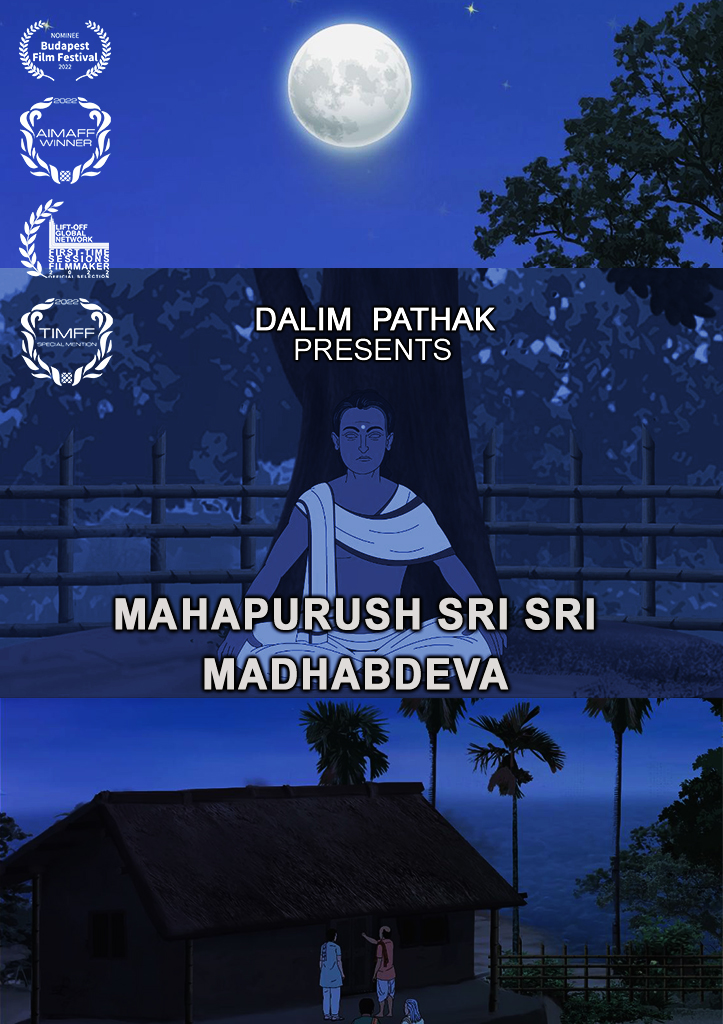Assamese animation film titled Mahapurush Sri Sri Madhabdeva has been receiving high praise and critical acclamation in various film festivals held around the world. The film, produced by Ramani Chitramm Memorial Trust, is conceptualized, scripted and directed by noted promoter, preserver of Sattriya culture and philanthropist, late Dalim Pathak.
It has always been Dalim Pathak’s endeavour to disseminate and promote the philosophy of saints Sankardeva, and his faithful disciple Madhabdeva, the creator of the epoch-making – Naam Ghosa. The film has bagged the Best Animation Film at the prestigious Athens International Monthly Art Film Festival 2022, for the month of January and the Special Mention award for Music at the Tokyo International Monthly Film Festival 2022.
Besides being a final nominee at the prestigious Budapest Film Festival, it has been officially selected to Kwetu International Animation Film Festival (KIAFF), Dar es Salaam, Tanzania, Festival del Cinema di Cefalu held in Sicily, Italy, Lift-Off Filmmaker Sessions at Pinewood Studios, among others. The film has greatly impressed audiences at the international festival circuit, which is quite a commendable achievement and a great sign for the future of animation movies in Assam.
Apart from being a visual treat, the film offered something unique and transcendental to the keen cinephiles, who were deeply engrossed by the incredible life and times of the revered 15th-century scholar and Vaishnavite saint Madhabdeva, widely known as an important preceptor of the Ekasarana Naam Dharma and for his contributions to the legacy of Sankardeva. The saint has left an indelible mark in the social and cultural life of Assam through his extraordinary literary creations. The much revered Vaishnavite saint had composed numerous works on holy themes in different literary forms that reveal his great erudition, intense devotion and ingenuity. His profound efforts not only played a significant role in the growth of the Satras and Sattriya culture, but also helped create an atmosphere that fostered and enhanced harmony, understanding and tolerance among people hailing from various castes, creeds and communities. The creator of the epoch-making Naam Ghosa has also penned several devotional songs called Borgeet.
The film has been made with an attempt to spread the intellectual and spiritual legacy of Mahapurush Madhabdeva, and the need for the new generation to follow the saint’s footsteps and uphold traditional values, which have eroded to a great extent.
The music of the movie has been composed by noted Sattriya artiste Gunindra Nath Ojha, classical vocalist Jiten Basumatary and noted singer Hemen Das, while the songs are rendered by the Burha Sattriya of Barpeta Satra Basistha Dev Sarma, Deka Sattriya of Barpeta Satra late Nabajit Das Pathak, Gunindra Nath Ojha, Hemen Das, Jiten Basumatary, Madhusmita Bhattacharya, Krantika Sandilya, Jonali Ojha Basumatary, Rabindra Nath Das and Dinesh Das. The film’s background music has been done by Samir Sarkar and Manab Jyoti Das. The film’s script, dialogue and research works have been done by Prabhat Chandra Das. A team of animators have put their heart and soul into the project, while going through the complex process of creating and finishing each and every other animated scene, bringing about an accurate reflection of the revered saint.
The film’s associate director is Abani Ranjan Pathak and assistant director is Dipmoni Chutia. Mahapurush Sri Sri Madhabdeva features a number of profoundly moving traditional Borgeets and Ghosas, including Aalo bhai chalo Aais, Aalo moi ki kohbo dukh, Muke ebar karuna, Narayan kahe bhokoti koru, Pawe pori hari, Pamru mon Ram charane, Moi durasar, among others.
The film features an impressive list of actors, providing voices to various roles in the film, including Ranjan Bezbaruah (Madhavadeva), Nipon Goswami, late Sadhan Hazarika, Dinesh Das, Ashim Krishna Boruah, Syed Sadullah, Surnjit Malakar, Arati Kalita, Anamika Bordoloi, Jayanta Bhagawati, Abani Bora, Nayan Prasad, Nikumani Barua, etc.
The film also owes a great deal to the contributions of late Narayan Chandra Goswami, satradhikar of Natun Kamalabari Satra and late Harekrishna Mahanta, the satradhikar of Barangajuli Satra, who generously provided their invaluable inputs and guidance.

